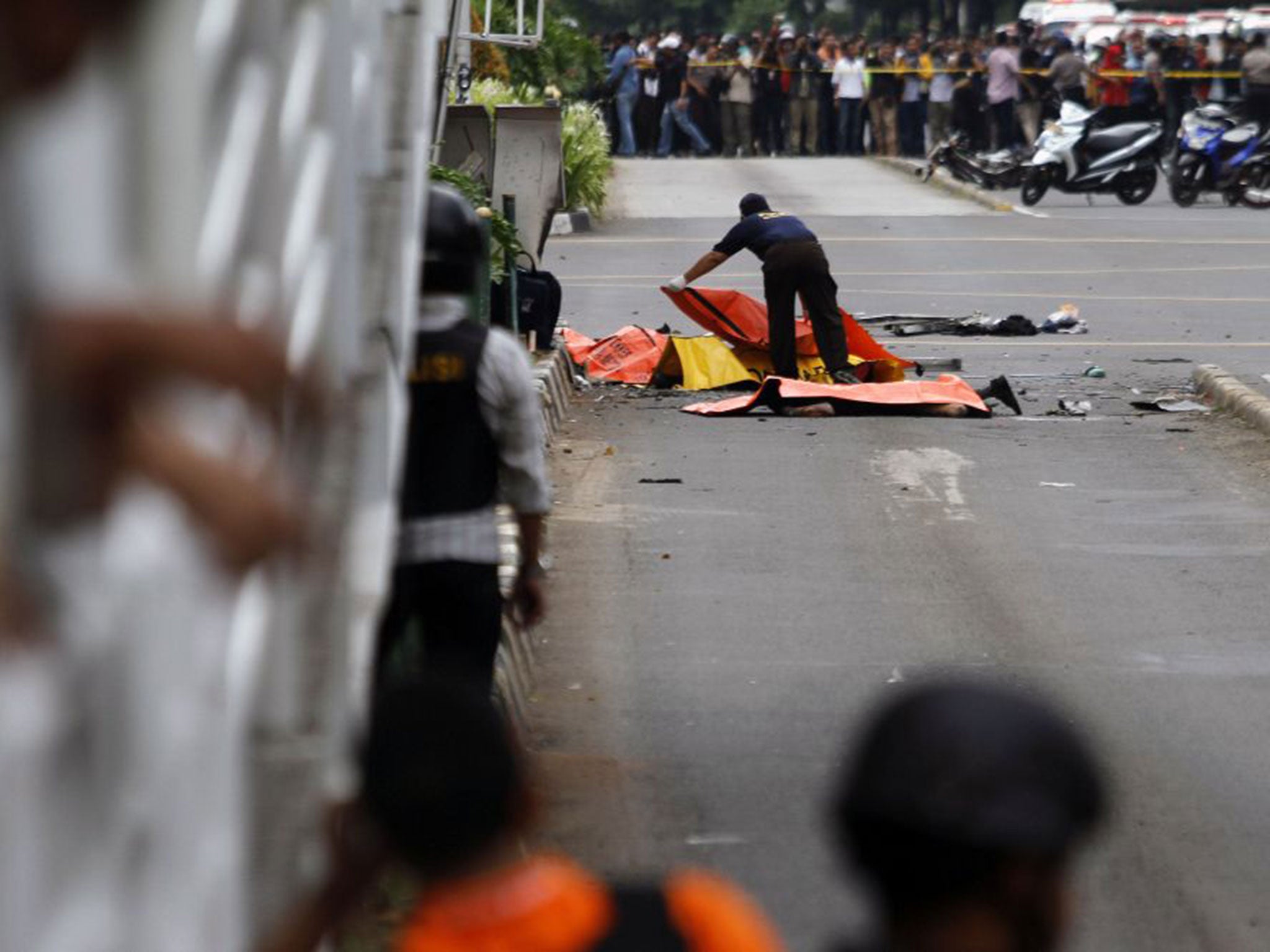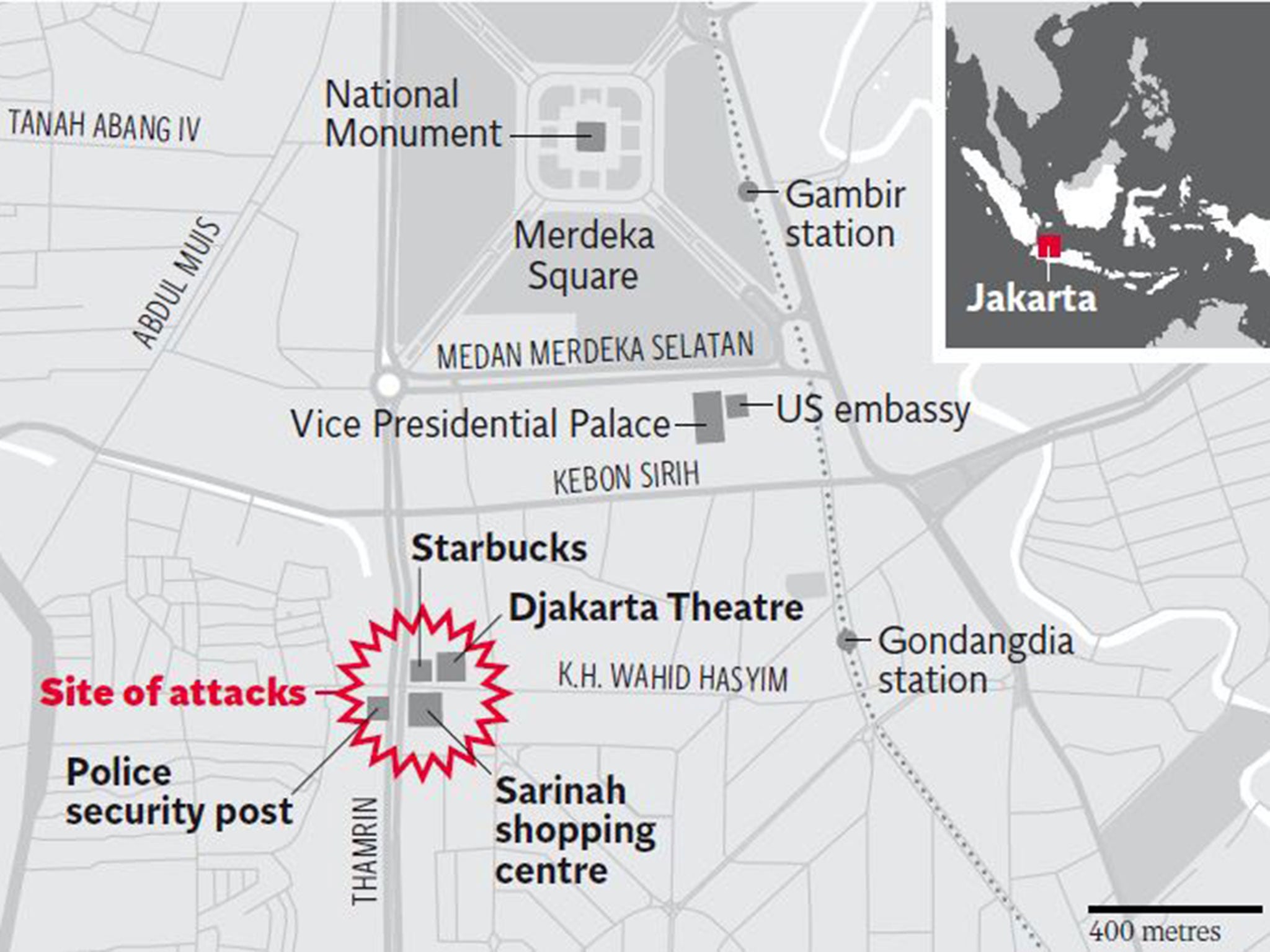Jakarta attacks: Seven gunmen involved tried to imitate Paris atrocity, police say
Alleged ringleader had called on followers to study the tactics which left 130 people dead in the French capital

Your support helps us to tell the story
From reproductive rights to climate change to Big Tech, The Independent is on the ground when the story is developing. Whether it's investigating the financials of Elon Musk's pro-Trump PAC or producing our latest documentary, 'The A Word', which shines a light on the American women fighting for reproductive rights, we know how important it is to parse out the facts from the messaging.
At such a critical moment in US history, we need reporters on the ground. Your donation allows us to keep sending journalists to speak to both sides of the story.
The Independent is trusted by Americans across the entire political spectrum. And unlike many other quality news outlets, we choose not to lock Americans out of our reporting and analysis with paywalls. We believe quality journalism should be available to everyone, paid for by those who can afford it.
Your support makes all the difference.A marauding assault by gunmen and suicide bombers in the Indonesian capital has been claimed by Isis after seven people – including five of the attackers – died in an attack apparently intended to mimic the mass murders in Paris.
The attacks on three separate areas of central Jakarta early on 14 January are thought to be the first time that Isis-inspired violence has come to the world’s most populous Muslim country. Up to 700 Indonesians are thought to have travelled to Syria and Iraq in recent years to join the group.
Police said they believed the cell of seven gunmen had intended to copy the Paris assaults after the alleged ringleader of the Jakarta attacks – an Indonesian based in Syria – called on followers to study the tactics which left 130 people dead in the French capital.
The audacious nature of the assault was mercifully unmatched by the death toll – of the seven who died, five were the attackers themselves. Security experts said the low number of fatalities suggested the attackers were relatively untrained and using rudimentary weapons.
A Canadian citizen and an Indonesian police officer were killed and up to 20 people, including a number of foreigners, were injured. Two of the attackers, who were all young Indonesian men and at least some of whom were equipped with improvised hand grenades and larger bombs, were captured alive.

It took security forces some three hours to quell the assault, which began shortly before 11am when up to three gunmen, each also apparently armed with suicide vests, targeted a branch of Starbucks in an area of the city housing international organisations, embassies and luxury hotels.
Police and army armoured personnel carriers flooded on to the streets as the normally traffic-choked thoroughfares of the Indonesian capital emptied, and six explosions and a gunfight in a cinema ensued as the attackers were pursued by security forces.
Photographs appeared to show one of the gunmen brandishing a pistol as he walked calmly among fleeing crowds while footage showed two loud explosions in the car park of Starbucks sending palls of white smoke into the skies.
The Indonesian security forces had been on a state of high alert after Isis warned around the new year that there would be a “concert” in the country that would make “international news”. The warning was interpreted as Isis signalling that it intended to conduct an assault on a similar scale to that seen in France in November.
The police spokesman Anton Charliyan said: “From what we see, this group is following the pattern of the Paris attacks.”
The strong suspicion of the Indonesian authorities that the attack had been to a greater or lesser extent orchestrated from Syria was confirmed later when Isis released a statement claiming the atrocity. In a statement which differed from the figures for the number of attackers given by the authorities, the terror group said: “A group of soldiers of the caliphate in Indonesia targeted a gathering from the crusader alliance that fights the Islamic State [Isis] in Jakarta through planting several explosive devices that went off as four of the soldiers attacked with light weapons and explosive belts.”
Eyewitnesses said the Jakarta attack began when a suicide bomber entered the coffee shop between 10.50 and 10.55 and detonated his device, causing customers to run out. Bystanders described seeing three charred and blast-torn corpses lying in the road in the aftermath of the Starbucks attack. Panic gripped the area as further shots rang out nearby amid shouts of “sniper, sniper”.
Mohamed Reza, a security guard outside Starbucks, said: “I saw the explosions and window glass smashing. We helped two foreigners who were bleeding.” At about the same time two more attackers assaulted a traffic police booth, killing themselves and an officer, before the remaining two gunmen launched their own assault on a group of police close to Jakarta’s oldest department store. After a 15-minute gunfight the final attackers were killed.
Police said later that the discovery of a cache of improvised hand grenades and a larger device led them to believe the attackers had intended to set off secondary explosions to maximise the death toll.
Mr Charliyan: “So we think ... their plan was to attack people and follow it up with a larger explosion when more people gathered. But thank God it didn’t happen.”
The Jakarta police chief Major-General Tito Karnavian said the attackers were part of a group led by Bahrum Naim, an Indonesian militant who until 2009 had run an internet café in Java but is now believed to be in the Isis nerve centre of Raqqa.
Join our commenting forum
Join thought-provoking conversations, follow other Independent readers and see their replies
Comments